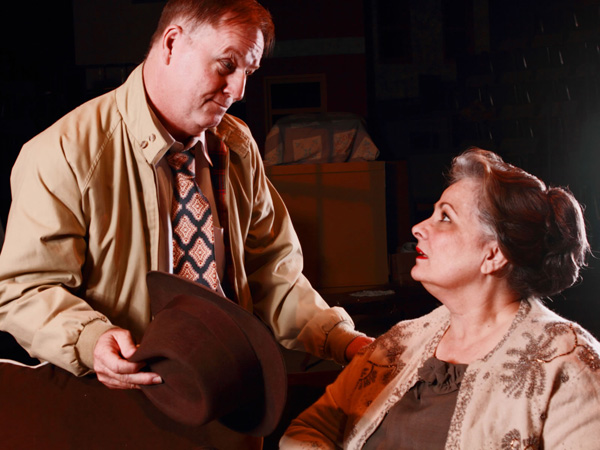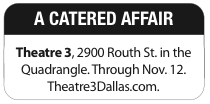A wedding spins out of control in the insightful musical ‘A Catered Affair’

FATHER OF THE BRIDE | A penny-pinching cabbie (Sonny Franks) argues with his wife (Sally Soldo) over the cost of their daughter’s reception in Theatre 3’s charmer ‘A Catered Affair.’
ARNOLD WAYNE JONES | Life+Style Editor
jones@dallasvoice.com
Not every marriage-minded gal is a bridezilla — not that anyone will believe it. Jane Hurley has simple tastes: A civil ceremony at the courthouse, followed by a quick honeymoon getaway driving a car cross-country for a friend. No place cards, no guest list, no nosegay — just a license, a vow and groom, with mom and dad watching.
Only who would buy that? Jane’s mom, Aggie (Sally Soldo) does, as does her dad (Sonny Franks), who’s happy not to exhaust his bankbook throwing a party for someone else. But the groom’s parents don’t like it, and the gossipy neighbors suspect such a quickie wedding bespeaks of a pregnant bride.
A Catered Affair is based on a 1956 movie (and an earlier teleplay) starring Bette Davis and Ernest Borgnine, but while the original was a schmaltzy comedy along the lines of Father of the Bride, the musical — adapted by Harvey Fierstein, with a score by composer John Bucchino — is something else entirely.
There are broad comic moments, most dealing with dad’s penny-pinching, but the core of the story is deeper, more meaningful. (The “dad’s a cheapskate” angle has been played out too many times to count, and takes a backseat here.) Jane has lived in the shadow of her brother, who was killed in Korea; her Uncle Winston (Chris Wagley) is profoundly wounded that he isn’t invited to the ceremony attributing it to Jane’s disguised embarrassment over having a gay relative. And the tension between her parents churns up long-standing resentments that threaten their marriage.
 Bucchino has composed a nice chamber musical with Sondheim-esque sensibilities (an asymmetrical rhyme scheme strung on staccato motifs that are occasionally lovely but defiantly unhummable). He’s more concerned with telling a story and revealing character than creating earworms for the drive home.
Bucchino has composed a nice chamber musical with Sondheim-esque sensibilities (an asymmetrical rhyme scheme strung on staccato motifs that are occasionally lovely but defiantly unhummable). He’s more concerned with telling a story and revealing character than creating earworms for the drive home.
Fierstein’s script expands on the gay content, making Uncle Win simultaneously flamboyant, coy, brittle and defensive. In fact, the book explores issues of social convention (who wants the wedding and why) with unexpected insight.
Director Jac Alder paces the show well, and strikes a tricky tone. This isn’t Death of a Salesman: The Musical. It shouldn’t be dour and heavy, even as it frankly addresses issues about war and child rearing and the ends of marriage.
This is Soldo’s best work. Her hair snapped into a tight, graying bun, clad in a frumpy housedress, she exudes a working class ma from the Bronx, boiling hambones to stretch her food dollar. It’s not a glamorous role, but she gives it not just authenticity, but weightiness, especially on “Our Only Daughter.”
Soldo is matched by Franks, who looks so unlike what you’d expect a musical comedy performer to look like, he’s one of the best there is. Their pairing works even as the script toggles between comic fable and serious social document. They are the heart and soul of A Catered Affair, and certainly make it worth an RSVP.
This article appeared in the Dallas Voice print edition October 21, 2011.













